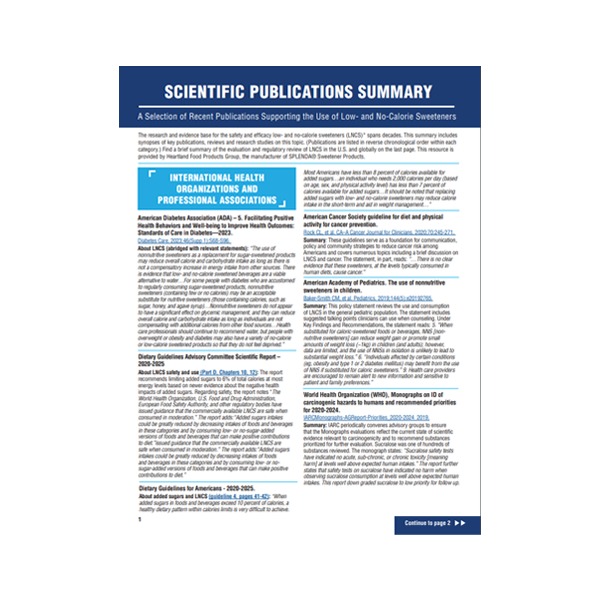
Consumers prefer Splenda Brand Sweeteners
Learn More
The safety and efficacy of low and zero calorie sweeteners (LNCS) have been researched for decades. This summary provides a selection of recent and well-designed scientific studies, articles and position statements in addition to a quick summary of the evaluation and regulatory review of LNCS in the U.S. and globally.
1 Ashwell, M., et. al. (2020). Nutr Res Rev. 2020 Jan 13:1-10. doi: 10.1017/S0954422419000283 *Among healthcare professionals clinically treating patients.
FAQs: 1. Roberts, A. (2016). The safety and regulatory process for low-calorie sweeteners in the United States. Physiology & Behavior. 164, Part B, 439-444. 2. (2019) Low Calorie Sweeteners and Sweet Taste. Calorie Control Council. Retrieved from: https://caloriecontrol.org/sweet-taste/ 3. When used in place of sugar; Rogers PJ, Hogenkamp PS, de Graaf C, et al. (2016) Does low-energy sweetener consumption affect energy intake and body weight? A systematic review, including meta-analyses, of the evidence from human and animal studies. Int J of Obes 40(3), 381-394. 4. Johnston C, Stevens B, Foreyt J et al. (2013) The Role of Low-calorie Sweeteners in Diabetes. Eur Endocrinology 9(2); 96-98. 5. Rogers PJ. The role of low-calorie sweeteners in the prevention and management of overweight and obesity: evidence v. conjecture. Proc Nutr Soc, 2017 Nov;23:1-9. 6. Lobach, A. R., Roberts, A., & Rowland, I. R. (2018). Assessing the in vivo data on low/no-calorie sweeteners and the gut microbiota. Food and Chemical Toxicology, 124, 385-399.